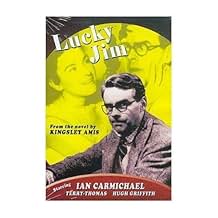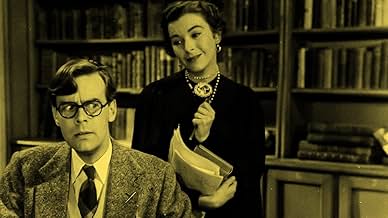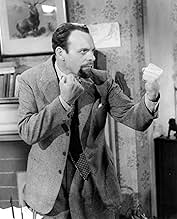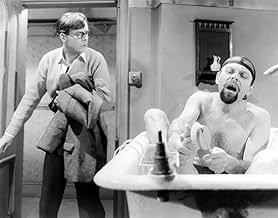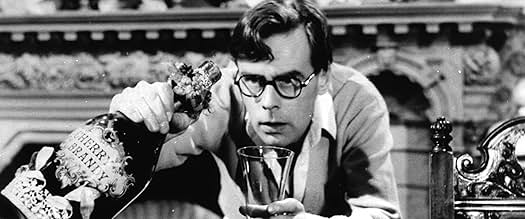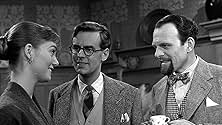Jim Dixon si sente tutt'altro che fortunato. All'università deve eseguire gli ordini del distratto e noioso professor Welch per avere qualche speranza di mantenere il suo lavoro.Jim Dixon si sente tutt'altro che fortunato. All'università deve eseguire gli ordini del distratto e noioso professor Welch per avere qualche speranza di mantenere il suo lavoro.Jim Dixon si sente tutt'altro che fortunato. All'università deve eseguire gli ordini del distratto e noioso professor Welch per avere qualche speranza di mantenere il suo lavoro.
- Regia
- Sceneggiatura
- Star
John Welsh
- The Principal
- (as John Welch)
Henry B. Longhurst
- Professor Hutchinson
- (as Henry Longhurst)
Recensioni in evidenza
Kingsley Amis might not had liked the adaptation of his novel set in a redbrick university in 1950s Britain when university education started to expand and took on some working class students. The Boulting brothers film comes across a little too much of an Ealing comedy for my liking with slapstick and loses the novel's edge.
Ian Carmichael is the northern grammar school boy made good but looking for a permanent teaching job at the university. To do this he has to toady to Professor Welch and his family and every task he is entrusted to do ends in disaster sometimes due to Jim's shortcomings.
As a lecturer Jim is passionate with a leftist slant on history in contrast with Professor Welch dull and old fashioned musings which we see when Jim has to deliver Welch's lecture.
In between we have Jim getting into escapades with Terry Thomas and his Canadian girlfriend and a slapstick scene involving a parade with flowers on the quadrant of the university.
However whilst Carmichael is spirited as Jim he looks too old, even worse Terry Thomas looks too old as the son of the Professor Welch.
The film is episodic and although starts promisingly enough it tries too hard to be an Ealing style comedy rather than a satirical adaptation. The redbrick university never convinces maybe I have seen too many of these places that were built in the 1960s.
Ian Carmichael is the northern grammar school boy made good but looking for a permanent teaching job at the university. To do this he has to toady to Professor Welch and his family and every task he is entrusted to do ends in disaster sometimes due to Jim's shortcomings.
As a lecturer Jim is passionate with a leftist slant on history in contrast with Professor Welch dull and old fashioned musings which we see when Jim has to deliver Welch's lecture.
In between we have Jim getting into escapades with Terry Thomas and his Canadian girlfriend and a slapstick scene involving a parade with flowers on the quadrant of the university.
However whilst Carmichael is spirited as Jim he looks too old, even worse Terry Thomas looks too old as the son of the Professor Welch.
The film is episodic and although starts promisingly enough it tries too hard to be an Ealing style comedy rather than a satirical adaptation. The redbrick university never convinces maybe I have seen too many of these places that were built in the 1960s.
Lucky Jim is directed by John Boulting and adapted from the Kingsley Amis novel of the same name. It stars Ian Carmichael, Terry-Thomas, Hugh Griffith, Sharon Acker and Jean Anderson.
A Redbrick university In Britain's New Elizabethan Age: Here Are Moulded The Intellectual Drakes And Raleighs Of Tomorrow-Fearless, Independent- -
And State Supported!
Enter Carmichael's accident prone Jim Dixon, who in order to keep his job at the University has to do the bidding for Griffith's dull Professor Welch. Worse still, maybe, is having to spend time with his boorish family, especially the Son, pompous show off Bertrand (Thomas). Salvation may come in the form of Bertrand's companion, though, Christine Callaghan (Acker)?
I haven't read the Amis novel this is based on, so can't have frame of reference there. By all accounts it's very different, and staunch Amis supporters are very dismissive of the Boulting movie. The film itself is hardly prime Boullting Brothers, who would produce British classics such as Brighton Rock and I'm All Right Jack, but it has a number of funny scenes whilst also being nicely flecked with satirical flavouring. Carmichael attacks the lead role with gusto and comic affability, while "scary eyebrows" Griffith and Terry-Thomas provide good comedy footings for Carmichael to work from. The ladies are pretty and effective enough, without really doing anything any other British actress of the time couldn't have done, but all told it's a well acted and genial time filler for the undemanding. 6.5/10
A Redbrick university In Britain's New Elizabethan Age: Here Are Moulded The Intellectual Drakes And Raleighs Of Tomorrow-Fearless, Independent- -
And State Supported!
Enter Carmichael's accident prone Jim Dixon, who in order to keep his job at the University has to do the bidding for Griffith's dull Professor Welch. Worse still, maybe, is having to spend time with his boorish family, especially the Son, pompous show off Bertrand (Thomas). Salvation may come in the form of Bertrand's companion, though, Christine Callaghan (Acker)?
I haven't read the Amis novel this is based on, so can't have frame of reference there. By all accounts it's very different, and staunch Amis supporters are very dismissive of the Boulting movie. The film itself is hardly prime Boullting Brothers, who would produce British classics such as Brighton Rock and I'm All Right Jack, but it has a number of funny scenes whilst also being nicely flecked with satirical flavouring. Carmichael attacks the lead role with gusto and comic affability, while "scary eyebrows" Griffith and Terry-Thomas provide good comedy footings for Carmichael to work from. The ladies are pretty and effective enough, without really doing anything any other British actress of the time couldn't have done, but all told it's a well acted and genial time filler for the undemanding. 6.5/10
I don't think this 1950's Boulting Brothers comedy dramatisation of Kingsley Amis's novel has aged well. It purports to mock upper-class academia of the time through the vessel of Ian Carmichael's title character (cue madrigal singers) as he gently rocks up against his so-called superiors and betters and supposedly knocks them down a peg or two with his freshness, unconventionality and honesty. It's funny how in so doing he comes off himself as a rather eccentric upper-class toff, one who you believe could still end up as one of the stuffy establishment figures he's presumably meant to contrast with.
It doesn't help that Carmichael is much too old in the part. The Angry Young Men were starting to make waves in British theatre and cinema at the time but here all we get a mildly querulous, getting-on-somewhat man blundering and blustering from one unlikely situation to another. The three main comedic set-pieces of Jim (cue madrigal singers) playing in an impromptu musical gathering at his college superior's house, disastrously arranging the floral display of the university procession to be attended by the new college chancellor and lastly his drunkenly irreverent speech on the designated theme of "Merrie England" in front of the assembled pupils and masters all fall flat with the only time I was remotely amused being when in his drunken state he predictably finds himself in the bedroom of his torch-carrying old-maid admirer and proceeds to shoot over the proverbial open goal. Somehow, in all this, he still gets the pretty young girl although the fact that his competition is Terry Thomas in an unsympathetically written-part makes that a foregone conclusion almost from their first meeting.
I see that contemporary critics compared Carmichael's performance as Jim (cue madrigal singers) with that of Jerry Lewis which somehow manages to insult them both. No one else in the cast stood out for me either although they were none of them helped by the dull screenplay and stodgy direction. If this is what passed for rebelliousness in late 50's British cinema, I can only say I'm glad that the so-called kitchen sink dramas with genuinely vibrant young talent like Finney, Harvey, Bates and Courteney were just around the corner.
Oh and those madrigal singers will infuriate you with every chorus!
It doesn't help that Carmichael is much too old in the part. The Angry Young Men were starting to make waves in British theatre and cinema at the time but here all we get a mildly querulous, getting-on-somewhat man blundering and blustering from one unlikely situation to another. The three main comedic set-pieces of Jim (cue madrigal singers) playing in an impromptu musical gathering at his college superior's house, disastrously arranging the floral display of the university procession to be attended by the new college chancellor and lastly his drunkenly irreverent speech on the designated theme of "Merrie England" in front of the assembled pupils and masters all fall flat with the only time I was remotely amused being when in his drunken state he predictably finds himself in the bedroom of his torch-carrying old-maid admirer and proceeds to shoot over the proverbial open goal. Somehow, in all this, he still gets the pretty young girl although the fact that his competition is Terry Thomas in an unsympathetically written-part makes that a foregone conclusion almost from their first meeting.
I see that contemporary critics compared Carmichael's performance as Jim (cue madrigal singers) with that of Jerry Lewis which somehow manages to insult them both. No one else in the cast stood out for me either although they were none of them helped by the dull screenplay and stodgy direction. If this is what passed for rebelliousness in late 50's British cinema, I can only say I'm glad that the so-called kitchen sink dramas with genuinely vibrant young talent like Finney, Harvey, Bates and Courteney were just around the corner.
Oh and those madrigal singers will infuriate you with every chorus!
It's hard for me to be objective about this film, as it is adapted from my favorite novel--which I've read eight or nine times. Also, I waited so long to see it that it may have been inevitable that I would ultimately be disappointed. Ironically, I first heard about the film some years before I read the book, and it was only after I read the book that I made the connection between it and the description my brother had once given me. It would be about 20 years (no kidding!) before I finally saw the film myself. I've now seen it twice and mostly hated it both times.
Kingsley Amis's LUCKY JIM was obligatory reading among history students when I was in grad school 30 years ago. The story about an unhappy history instructor in a crummy British provincial university expressed a lot of the angst that we felt as grad students, and it was funnier than heck as well. I loved the book then, and still love all these years later. Why, then, was the film such a disappointment? Mainly because the script muted much of the savageness of Amis's humor, and because it tacked on an idiotic chase scene at the end that has nothing whatever to do with the original story--or even with what goes before it in the film. (Even Ian Carmichael--who played Jim--hated that ending. He told me that the people making the film didn't seem to have any idea of what they were doing--and it shows.)
The producers also added a very unsatisfactory and irrelevant academic procession in them middle of the film--evidently for the sole purpose of making Carmichael look like a klutz by having him tripping over flowerpots and dropping things in the middle of the solemn affair.
Nevertheless, the film does have its virtues, chief among them is excellent casting. Ian Carmichael was born to play Jim. Terry-Thomas was properly unctuous as Bertrand; Hugh Griffith certainly looked the part as Professor Neddy; Maureen Connell looked like I imagined the neurotic Margaret Peel; and Sharon Acker made a fine-looking Christine Callaghan.
Kingsley Amis's LUCKY JIM was obligatory reading among history students when I was in grad school 30 years ago. The story about an unhappy history instructor in a crummy British provincial university expressed a lot of the angst that we felt as grad students, and it was funnier than heck as well. I loved the book then, and still love all these years later. Why, then, was the film such a disappointment? Mainly because the script muted much of the savageness of Amis's humor, and because it tacked on an idiotic chase scene at the end that has nothing whatever to do with the original story--or even with what goes before it in the film. (Even Ian Carmichael--who played Jim--hated that ending. He told me that the people making the film didn't seem to have any idea of what they were doing--and it shows.)
The producers also added a very unsatisfactory and irrelevant academic procession in them middle of the film--evidently for the sole purpose of making Carmichael look like a klutz by having him tripping over flowerpots and dropping things in the middle of the solemn affair.
Nevertheless, the film does have its virtues, chief among them is excellent casting. Ian Carmichael was born to play Jim. Terry-Thomas was properly unctuous as Bertrand; Hugh Griffith certainly looked the part as Professor Neddy; Maureen Connell looked like I imagined the neurotic Margaret Peel; and Sharon Acker made a fine-looking Christine Callaghan.
This is an outstanding movie whose meticulously-crafted set pieces frequently had me in stitches. Superbly cast, Ian Carmichael, Hugh Griffiths and Terry-Thomas were in exceptional form, and the luminous beauty of Sharon Acker lights up the film. If you don't find this funny, charming and uplifting, all I can say is that I feel sorry for you!
The pompous, stiff and class-deferential era of the 1950s is marvellously evoked in this movie. Always the sign of a classic, even the minor characters - Mrs Welch, the taxi driver, the waiter and the university porter, for instance - all hold their own and come across as real people. The appalling persona of Bertrand Welch (Terry-Thomas) with his self-obsessed sense of his own importance is excellently drawn. One to see and quite possibly one to keep.
The pompous, stiff and class-deferential era of the 1950s is marvellously evoked in this movie. Always the sign of a classic, even the minor characters - Mrs Welch, the taxi driver, the waiter and the university porter, for instance - all hold their own and come across as real people. The appalling persona of Bertrand Welch (Terry-Thomas) with his self-obsessed sense of his own importance is excellently drawn. One to see and quite possibly one to keep.
Lo sapevi?
- QuizAt 46 Terry-Thomas was a year older than Hugh Griffith, who played his father. Jean Anderson, playing his mother, was only 4 years older than Thomas.
- BlooperThe taxi used by Jim and Christine when leaving the ball has 'Taxi' on a paper sign in the windscreen which is not there in long shot.
- Curiosità sui creditiOpening credits prologue: A Redbrick University in Britain's new Elizabethan age: here are moulded the intellectual Drakes and Raleighs of tomorrow - fearless, independent - and state supported
- ConnessioniReferenced in Metropolitan Police: Lucky Jim (1999)
I più visti
Accedi per valutare e creare un elenco di titoli salvati per ottenere consigli personalizzati
- How long is Lucky Jim?Powered by Alexa
Dettagli
- Data di uscita
- Paese di origine
- Lingua
- Celebre anche come
- Volltreffer ins Glück
- Luoghi delle riprese
- The Royal Masonic School, Bushey, Hertfordshire, Inghilterra, Regno Unito(red-brick university where Jim works)
- Aziende produttrici
- Vedi altri crediti dell’azienda su IMDbPro
- Tempo di esecuzione1 ora 35 minuti
- Colore
Contribuisci a questa pagina
Suggerisci una modifica o aggiungi i contenuti mancanti

Divario superiore
By what name was Lucky Jim (1957) officially released in Canada in English?
Rispondi
